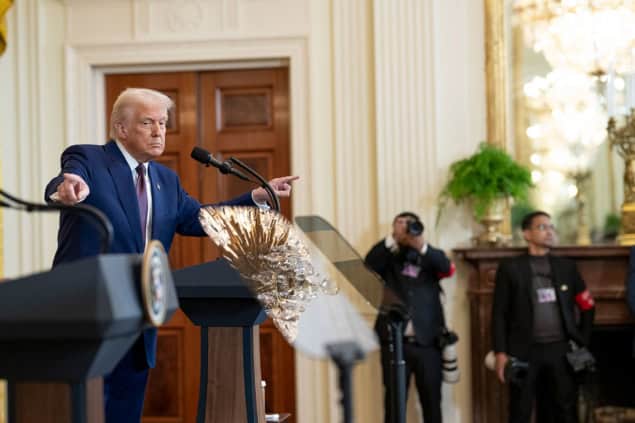Matin Durrani looks at the fall-out following Donald Trump’s re-election as US president

As physicists, we like to think that physics and politics are – indeed, ought to be – unconnected. And a lot of the time, that’s true.
Certainly, the value of the magnetic moment of the muon or the behaviour of superconductors in a fusion reactor (look out for our feature article next week) have nothing do with where anyone sits on the political spectrum. It’s subjects like climate change, evolution and medical research that tend to get caught in the political firing line.
But scientists of all disciplines in the US are now feeling the impact of politics at first hand. The new administration of Donald Trump has ordered the National Institutes of Health to slash the “indirect” costs of its research projects, threatening medical science and putting the universities that support it at risk. The National Science Foundation, which funds much of US physics, is under fire too, with staff sacked and grant funding paused.
Trump has also signed a flurry of executive orders that, among other things, ban federal government initiatives to boost diversity, equity and inclusion (DEI) and instruct government departments to “combat illegal private-sector DEI preferences, mandates, policies, programs and activities”. Some organizations are already abandoning such efforts for fear of these future repercussions.
What’s troubling for physics is that attacks on diversity initiatives fall most heavily on people from under-represented groups, who are more likely to quit physics or not go into it in the first place. That’s bad news for our subject as a whole because we know that a diverse community brings in smart ideas, new approaches and clever thinking.
How should scientists deal with politicians who don’t respect science?
The speed of changes in the US is bewildering too. Yes, the proportion from federal grants for indirect costs might be too high, but making dramatic changes at short notice, with no consultation is bizarre. There’s also a danger that universities will try to recoup lost money by raising tuition fees, which will hit poorer students the hardest.
US science has long been a beacon of excellence, a top destination especially for researchers from other nations. But many scientists are fearful of speaking out, scared that they or their institutions will pay a price for any opposition.
So far, it’s been left to senior leaders such as James Gates – a theoretical physicist at the University of Maryland – to warn of the dangers in store. “My country,” he said at an event earlier this month, “is in for a 50-year period of a new dark ages.”
I sincerely hope he’s wrong.




